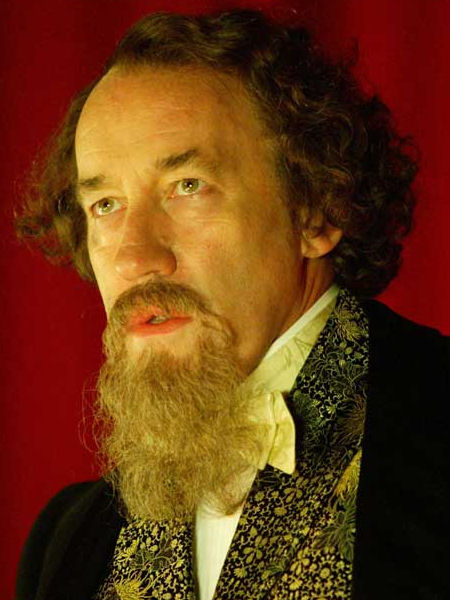Charles Dickens

(this image appears for illustrative purposes only and no attempt is made to supersede any copyright attributed to it)
Charles Dickens
Charles Dickens (died 1870) was a famous 19th century British author. Gwyneth referred to him as "the great man". In the last years of his life, he entered a period of melancholy, seemingly brought on by emotional estrangement from his family.
In 1869, he was on a gruelling tour of public performances of A Christmas Carol, a work he had written many years earlier. During this period, he despaired of his life being merely a series of recitations of his past successes.
In the Taliesin Lodge in Cardiff, on December 24, his reading of A Christmas Carol was interrupted when the Gelth-inhabited corpse of Mrs Peace had blue smoke coming from her. He accused the Ninth Doctor of creating a light show. The Doctor, seeing his companion, Rose Tyler, being taken by the Sneed and Company hearse after the hearse had reclaimed Mrs Peace's body, followed after them with Dickens' in Dickens' coach.
Even after seeing more reanimated corpses in the funeral parlour upon saving Rose, Dickens clashed with the Doctor, as he firmly believed in the rational world. Dickens was not prepared to entertain the more fantastical elements of life. The Doctor, however, saw that things humans considered "supernatural" were in fact just extra-terrestrial reality. Thus the Doctor was open to participating in a séance as a way of communicating with the Gelth, while Dickens viewed such things as the antithesis of rationality.
The Gelth began breaching through, thanks to the servant girl, Gwyneth, but instead of finding temporary bodies until the Doctor could find something permanent, "a few billion" came through, and cornered the Doctor and Rose. Dickens opened the gas throughout the funeral parlour, sucking the Gelth out of the corpses and back into the gas. He told the Doctor to do the same. Though not able to send them back where they came from, Gwyneth was able to hold the Gelth on the building by setting the parlour alight, saving the world.
By the end of the ordeal, Dickens emerged with a belief that he had only just begun to learn about the universe. With his re-invigorated sense of wonder, he resolved to tell the tale of the Gelth affair in the form of the ending to his novel The Mystery of Edwin Drood.
The Doctor knew he would not live long enough to do so, but knew that when he did die, he did so a happier man. He died the following year.
In a world where all of history occurred at once because River Song didn't kill the Doctor, Dickens appeared on BBC Breakfast being interviewed about his "new Christmas special."
Biography from the TARDIS Data Core article, licensed under CC-BY-SA
Notes for Charles Dickens | ||
Charles Dickens to the rescue Credit: BBC Worldwide
|


 Home Region:
Home Region: